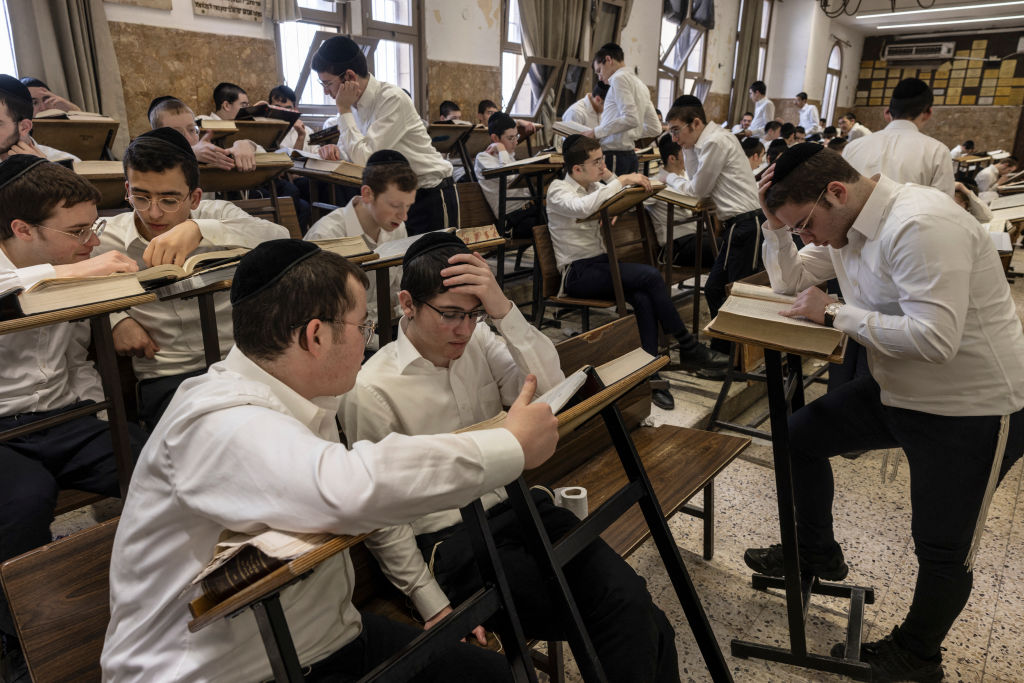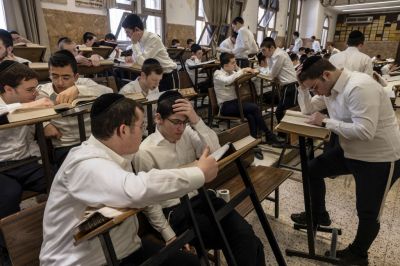TEL AVIV, Israel—Israel’s Supreme Court ruling last week to freeze state funding to certain ultra-Orthodox schools has brought to the fore a longtime debate in Israeli society: whether ultra-Orthodox Jews, also known as Haredim, should be required to serve in the military.
As Israeli Prime Minister Benjamin Netanyahu tries to sidestep the political fallout of the ruling, the decision and its aftermath have highlighted persistent divides between religious and secular Israelis in the midst of a war.
Where did this debate come from?
Last Thursday, Israel’s Supreme Court issued an interim ruling freezing state funding for the seminaries, or yeshivas, attended by ultra-Orthodox, military-eligible students. The decision came ahead of a April 1 deadline, set after the last legislative workaround expired last June, for the government to pass a law officially exempting the Haredim from mandatory service—which it has yet to do amid disagreements between religious and secular parties in Netanyahu’s coalition—or enforce the conscription of military age men. In the week since, thousands of Haredim have demonstrated against the court’s order, blocking traffic near the central, ultra-Orthodox city of Bnei Brak.
But the debate over whether compulsory military service should extend to Israel’s ultra-Orthodox communities dates much further back, to the country’s founding. The Haredim have been more or less exempt from the draft since the time of Israel’s founding in 1948, while other Jewish Israelis are expected to serve in the Israel Defense Forces (IDF)—in combat and non-combat roles—after they turn 18. In general, men serve for at least 32 months and women serve for at least 24 months.
The exemption allows ultra-Orthodox men of fighting age to study the Torah at religious schools often heavily subsidized by the Israeli government. But the war against Hamas in Gaza—and looming conflict with Hezbollah in Lebanon—has created a new sense of urgency to either limit or end the carve-out amid concerns about the military’s ability to fight on multiple fronts.
“As a result of the war, the Israeli military command discovered that they do not have enough soldiers to fight on both fronts at the same time,” Yoni Ben-Menachem, an Israel-based political analyst, told The Dispatch. “We are facing a big problem. The Israeli army lacks at least 10,000 to 12,000 soldiers.”
What do opponents of the exemption say?
Defense Minister Yoav Gallant, a member of Netanyahu’s Likud party, voiced the main argument for ending blanket exemptions last month: “The army is in need of manpower now. It’s not a matter of politics, it’s a matter of mathematics.”
As Israel’s need for a large standing army grows, so too has the number of ultra-Orthodox students avoiding conscription. The number of Torah students has increased by 53 percent in the last 12 years and 7.3 percent in 2023 alone, according to the Israel Democracy Institute (IDI), reaching a total of 167,500. And those figures are expected to grow. The ultra-Orthodox are Israel’s fastest-growing demographic, with the Central Bureau of Statistics projecting that Haredim will make up 16 percent of the population by the end of the decade.
This trend presents practical challenges to the military echelon as it tries to fill its ranks. But some lawmakers argue that the carve-outs also undermine a feeling of national solidarity in wartime, as secular Israelis feel they’re shouldering the weight of Israel’s defense alone. In a March poll by IDI, 70 percent of Jewish Israelis said they want changes to the system that currently allows Haredi men to avoid military service.
Passing a law enshrining that exemption, as ultra-Orthodox parties in the government are trying to do, “would be crossing a red line during normal times, and during the war, it’s like flying a black flag over it,” Benny Gantz, a member of Israel’s war Cabinet and leader of the National Unity alliance, said last week. “We will not be able to look in the eyes of fighters within our borders and beyond them, and ask them to extend their service.”
What’s the case for protecting the carve-out?
To most Haredi communities in Israel, joining the army is seen as a potentially corrupting distraction from religious study. Military service involves mixing with secular society and devoting less time to prayer, which many ultra-Orthodox Jews believe is vital for the continued survival of the Jewish state. It also interferes with adherence to certain religious practices, such as maintaining strict kosher standards and keeping Shabbat—a weekly period of rest that begins at sundown on Fridays and ends at sundown on Saturdays.
Gallant said Tuesday that the IDF is hoping to address some of these issues by creating a “plan of action” to promote ultra-Orthodox enlistment under “conditions that are suitable for the Haredi lifestyle.” But it’s unlikely to be enough to assuage concerns about religious purity. Some ultra-Orthodox men have vowed to leave Israel, go to prison, or die before agreeing to enlist.
In its recent decision pushing ultra-Orthodox conscription, the Supreme Court is trying “to create a fratricidal war,” Aryeh Deri, the leader of the Shas, an ultra-Orthodox political party in Netanyahu’s governing coalition, said last week. “The ruling of the High Court of Justice destroys the foundations of the Jewish identity of the State of Israel. The judges of the High Court of Justice want to saw off the branch of existence of the Jewish people.”
Will there be political ramifications for Netanyahu?
The longstanding debate over whether the ultra-Orthodox should serve in the military nearly led to the collapse of Netanyahu’s coalition this week. In an appeal to ultra-Orthodox party leaders, the prime minister had previously promised to enshrine the carve-out—a process that arguably began with his controversial judicial reform plan, which in its original iteration would have significantly rolled back the power of the left-leaning high court. But Netanyahu’s ability to deliver on that promise is now in question, as the court reasserts its authority on the issue of military exemptions and secular members of the emergency government leverage their position.
The culmination of challenges created a lose-lose situation for Netanyahu in recent days: Ultra-Orthodox party leaders threatened to leave over the Supreme Court’s order to begin recruiting yeshiva students, while Gantz said his centrist National Unity party would withdraw from the emergency government if legislation was passed to formalize their exemption from military service.
But Netanyahu may have sidestepped a crisis—for now. Recognizing that the left-wing government likely to come to power in the event of the prime minister’s ouster would be less open to the exemptions than Netanyahu, the ultra-Orthodox parties seem to be biding their time in the hopes of getting legislation passed in the coming months.
“The religious schools have enough money to go on without financial support for a few months,” said Ben-Menachem, the Israel-based analyst. “Netanyahu and the religious parties look at this crisis as a political crisis—a conspiracy to topple the right-wing government during the war. And they’re not going to go into the trap.”







Please note that we at The Dispatch hold ourselves, our work, and our commenters to a higher standard than other places on the internet. We welcome comments that foster genuine debate or discussion—including comments critical of us or our work—but responses that include ad hominem attacks on fellow Dispatch members or are intended to stoke fear and anger may be moderated.
With your membership, you only have the ability to comment on The Morning Dispatch articles. Consider upgrading to join the conversation everywhere.